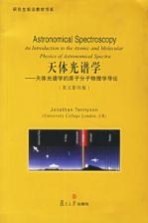图书介绍
天体光谱学:天体光谱学的原子分子物理学导论pdf电子书版本下载

- (英)丁尼生著 著
- 出版社: 上海:复旦大学出版社
- ISBN:7309052048
- 出版时间:2006
- 标注页数:192页
- 文件大小:54MB
- 文件页数:215页
- 主题词:天体-光谱学-研究生-教学参考资料-英文
PDF下载
下载说明
天体光谱学:天体光谱学的原子分子物理学导论PDF格式电子书版下载
下载的文件为RAR压缩包。需要使用解压软件进行解压得到PDF格式图书。建议使用BT下载工具Free Download Manager进行下载,简称FDM(免费,没有广告,支持多平台)。本站资源全部打包为BT种子。所以需要使用专业的BT下载软件进行下载。如 BitComet qBittorrent uTorrent等BT下载工具。迅雷目前由于本站不是热门资源。不推荐使用!后期资源热门了。安装了迅雷也可以迅雷进行下载!
(文件页数 要大于 标注页数,上中下等多册电子书除外)
注意:本站所有压缩包均有解压码: 点击下载压缩包解压工具
图书目录
1.Why Record Spectra of Astronomical Objects? 1
1.1 A Historical Introduction 1
1.2 What One Can Learn from Studying Spectra 3
2.The Nature of Spectra 7
2.1 Transitions 7
2.2 Absorption and Emission 8
2.3 Other Measures of Transition Probabilities 10
2.4 Stimulated Emission 10
2.5 Optical Depth 11
2.6 Critical Density 12
2.7 Wavelength or Frequency? 13
2.8 The Electromagnetic Spectrum 14
3.Atomic Hydrogen 17
3.1 Overview 17
3.2 The Schr?dinger Equation of Hydrogen-Like Atoms 17
3.3 Reduced Mass 18
3.4 Atomic Units 19
3.5 Wavefunctions for Hydrogen 20
3.6 Energy Levels and Quantum Numbers 21
3.7 H-Atom Discrete Spectra 23
3.8 H-Atom Spectra in Different Locations 30
3.8.1 Balmer series 30
3.8.2 Lyman series 33
3.8.3 Infrared lines 34
3.9 H-Atom Continuum Spectra 35
3.9.1 Processes 35
3.9.2 H-atom emission in H Ⅱ regions 36
3.10 Radio Recombination Lines 38
3.11 Radio Recombination Lines for Other Atoms 40
3.12 Angular Momentum Coupling in the Hydrogen Atom 43
3.13 The Fine Structure of Hydrogen 44
3.14 Hyperfine Structure in the H Atom 46
3.15 Allowed Transitions 47
3.16 Hydrogen in Nebulae 48
4.Complex Atoms 51
4.1 General Considerations 51
4.2 Central Field Model 52
4.3 Indistinguishable Particles 54
4.4 Electron Configurations 55
4.5 The Periodic Table 57
4.6 Ions 58
4.7 Angular Momentum in Complex Atoms 59
4.7.1 L-S or Russell-Saunders coupling 60
4.7.2 j-j coupling 61
4.7.3 Why two coupling schemes? 62
4.8 Spectroscopic Notation 62
4.9 Parity of the Wavefunction 64
4.10 Terms and Levels in Complex Atoms 64
5.Helium Spectra 69
5.1 He Ⅰand He Ⅱ Spectra 69
5.2 Selection Rules for Complex Atoms 71
5.3 Observing Forbidden Lines 74
5.4 Grotrian Diagrams 75
5.5 Potential Felt by Electrons in Complex Atoms 77
5.6 Emissions of Helium-Like Ions 78
6.Alkali Atoms 81
6.1 Sodium 81
6.2 Spin-Orbit Interactions 84
6.3 Fine Structure Transitions 88
6.4 Astronomical Sodium Spectra 89
6.5 Other Alkali Metal-Like Spectra 93
7.Spectra of Nebulae 99
7.1 Nebulium 99
7.2 The Bowen Mechanism 104
7.3 Two Valence Electrons 108
7.4 Autoionisation and Recombination 110
8.X-Ray Spectra 116
8.1 The Solar Corona…………? 120
8.2 Isotope Effects 120
9.Molecular Structure 124
9.1 The Born-Oppenheimer Approximation 125
9.2 Electronic Structure of Diatomics 126
9.2.1 Labelling of electronic states 128
9.2.2 Symmetry 130
9.2.3 State labels 132
9.3 Schr?dinger Equation 132
9.4 Fractionation 137
9.5 Vibration-Rotation Energy Levels 138
9.6 Temperature Effects 141
9.6.1 Rotational state populations 141
9.6.2 Vibrational state populations 143
9.6.3 Electronic state populations 144
10.Molecular Spectra 146
10.1 Selection Rules:Pure Rotational Transitions 146
10.1.1 Isotope effects 151
10.1.2 Rotational spectra of other molecules 151
10.1.3 Rotational spectra of molecular hydrogen 154
10.2 Vibrational Transitions 155
10.2.1 Structure of the spectrum 156
10.2.2 Isotope effects 159
10.2.3 Hydrogen molecule vibrational spectra 159
10.3 Electronic Transitions 161
10.3.1 Selection rules 161
10.3.2 Vibrational selection rules 163
10.3.3 Rotational selection rules 164
10.3.4 Transition frequencies 165
10.3.5 Astronomical spectra 166
10.4 Non-1Σ Electronic States 169
10.5 Maser Emissions 171
Solutions to Model Problems 174
Further Reading and Bibliography 186
Index 187